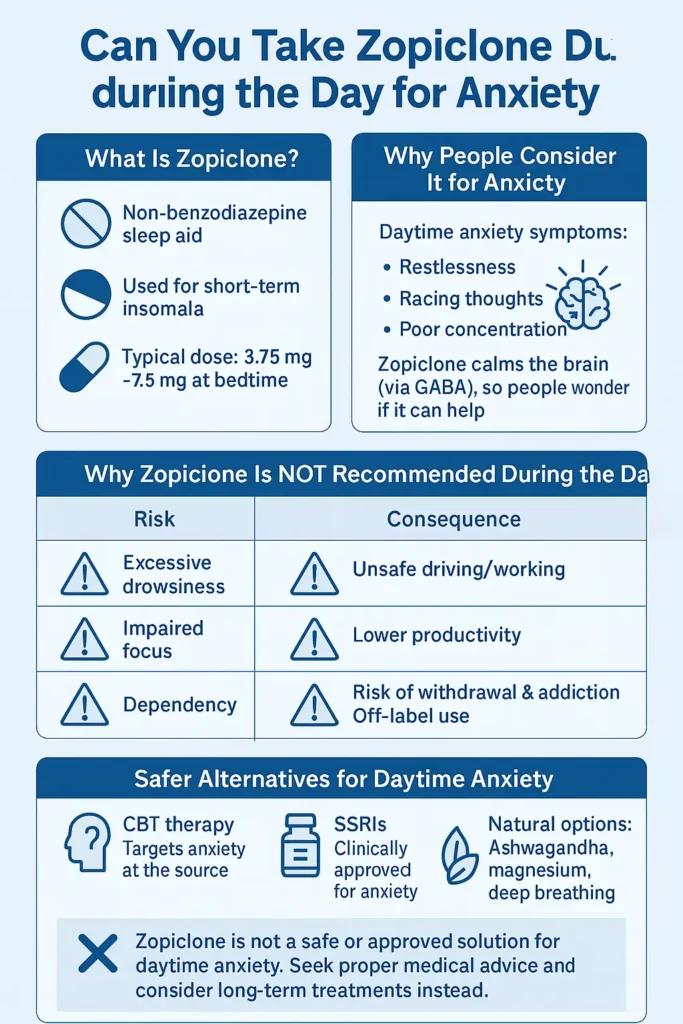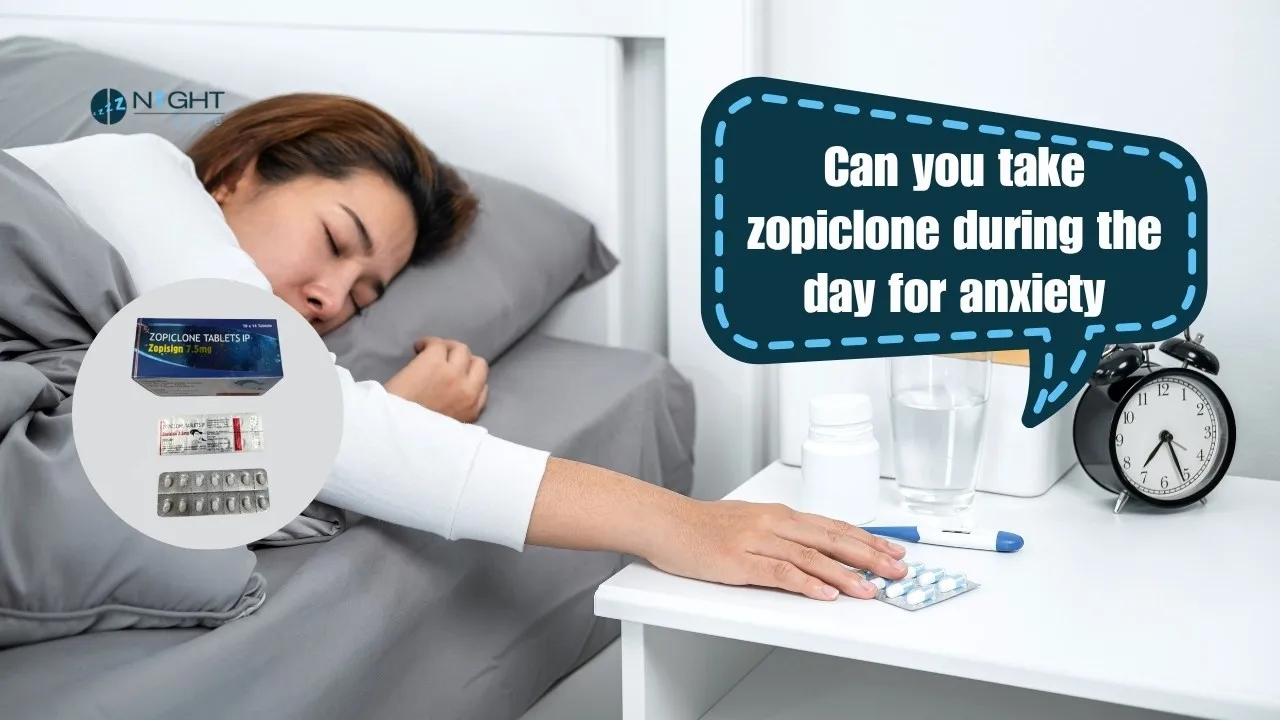Zopiclone is commonly prescribed as a short-term treatment for insomnia. But as anxiety-related sleep issues continue to rise, many people are asking: Can you take zopiclone during the day for anxiety? In this article, we’ll explore the medical use of zopiclone, its mechanism, and whether it’s safe or effective for daytime anxiety relief.
Let’s break down everything you need to know—clearly, honestly, and with search-friendly detail.
Contents
- 1 What Is Zopiclone?
- 2 Why People Consider Taking Zopiclone During the Day
- 3 Is Zopiclone Approved for Anxiety?
- 4 Can You Take Zopiclone During the Day?
- 5 What Happens If You Take Zopiclone During the Day?
- 6 What Are the Risks of Misusing Zopiclone?
- 7 Better Alternatives for Daytime Anxiety
- 8 Zopiclone vs. Anti-Anxiety Medications: A Quick Comparison
- 9 Final Verdict: Can You Take Zopiclone During the Day for Anxiety?
- 10 When to Talk to a Doctor
- 11 FAQs About Zopiclone and Anxiety
- 12 Final Thoughts
What Is Zopiclone?
Zopiclone is a non-benzodiazepine hypnotic medication used primarily to treat insomnia. It works by enhancing the action of gamma-aminobutyric acid (GABA), a neurotransmitter in the brain that has a calming effect. This helps reduce overactivity in the brain, allowing users to fall asleep faster and stay asleep longer.
Zopiclone is typically prescribed in dosages of 3.75 mg, 7.5 mg, or sometimes Zopiclone 7.5 mg at night. Its effects can be felt within 30 minutes and may last for 6–8 hours.
Why People Consider Taking Zopiclone During the Day
Many people struggling with anxiety find that their symptoms are not limited to bedtime. Daytime anxiety can manifest as:
- Racing thoughts
- Palpitations
- Restlessness
- Difficulty concentrating
- Irritability
Since zopiclone has calming, sedative-like effects, it’s understandable that people wonder: “Can I use zopiclone during the day to manage my anxiety symptoms?”
Let’s explore that question in depth.
Is Zopiclone Approved for Anxiety?
No, zopiclone is not approved or recommended for the treatment of anxiety disorders. It is a medication specifically licensed for the short-term management of insomnia. While it may induce temporary calmness, this effect is not the same as the targeted treatment of anxiety with drugs like:
- SSRIs (Selective Serotonin Reuptake Inhibitors)
- Benzodiazepines (such as lorazepam or diazepam, used short-term)
- Buspirone
- Beta-blockers (like propranolol, for physical anxiety symptoms)
So, while the sedative nature of zopiclone might seem like a potential solution for anxiety, its daytime use raises several concerns.
Can You Take Zopiclone During the Day?
Medically speaking: No, it is not advised.
Taking zopiclone during the day can cause:
- Excessive drowsiness
- Impaired coordination and cognition
- Delayed reaction time
- Difficulty operating machinery or driving
- Dependency with repeated use
Zopiclone has a half-life of around 5 hours, which means it stays in your system for a while, and even after the sedative effect wears off, you may still feel mentally “foggy.”

Would Doctors Prescribe Zopiclone for Daytime Use?
Very rarely. If prescribed during the day, it might only be under strict medical supervision, and not for anxiety. Sometimes, in hospital settings or in terminal illnesses, sedative medications are used to manage distress—but this is not the norm for anxiety treatment in otherwise healthy individuals.
What Happens If You Take Zopiclone During the Day?
Taking zopiclone during the day can affect your ability to function normally. Here’s what users have reported when using zopiclone outside of nighttime hours:
| Effect | Description |
|---|---|
| Drowsiness | Most common side effect, lasting several hours |
| Brain fog | Users may feel “out of it” or mentally slow |
| Poor concentration | Harder to focus or remember tasks |
| Reduced alertness | Dangerous when driving or at work |
| Rebound insomnia | You may sleep worse the next night |
| Dependence risk | Using it to calm anxiety may build habit-forming behavior |
If you’re wondering “can zopiclone be used for daytime panic attacks or social anxiety?”, the answer is still no. Better long-term and short-term medications exist for these issues, with fewer functional drawbacks.
What Are the Risks of Misusing Zopiclone?
Zopiclone is considered safe when used as prescribed for sleep, but off-label use (especially during the day) increases risks:
1. Dependency & Tolerance
Using zopiclone for anxiety may train your body to rely on a sedative for calm, leading to psychological and physical dependence.
2. Withdrawal Symptoms
Stopping suddenly after long-term use can lead to rebound anxiety, irritability, tremors, and even seizures in some cases.
3. Masking Symptoms
Using sedatives like zopiclone might cover up anxiety, but not treat the root cause. This delays appropriate mental health care.
Better Alternatives for Daytime Anxiety
If you’re struggling with daytime anxiety, you’re not alone—and better options exist than zopiclone.
✅ Cognitive Behavioral Therapy (CBT)
CBT is one of the most effective treatments for anxiety. It targets negative thought patterns and teaches coping skills.
✅ Prescription Medications
- SSRIs (like sertraline, fluoxetine): first-line treatment
- Benzodiazepines (short-term use only)
- Buspirone: non-sedative anti-anxiety medication
✅ Natural & Over-the-Counter Options
- Magnesium supplements
- Ashwagandha (an adaptogen for stress)
- L-theanine (found in green tea)
- Lavender or chamomile-based calming teas
- Guided meditation or deep breathing apps
Also Read: How Long Does Zopiclone Stay in Your System? Half-Life, Effects & More
Zopiclone vs. Anti-Anxiety Medications: A Quick Comparison
| Feature | Zopiclone | Anti-Anxiety Medications (e.g., SSRIs) |
|---|---|---|
| Approved for Anxiety | ❌ No | ✅ Yes |
| Sedative Effects | ✅ Strong | ❌ Mild or None |
| Risk of Dependence | ⚠️ High | ✅ Low (for SSRIs) |
| Daytime Functioning | ⚠️ Impaired | ✅ Preserved |
| Long-term Use | ❌ Not recommended | ✅ Often required |
| Onset of Relief | ✅ Fast (within 30 mins) | ❌ Slower (weeks for SSRIs) |
Final Verdict: Can You Take Zopiclone During the Day for Anxiety?
In summary:
- Zopiclone is not designed for or approved to treat anxiety.
- Daytime use can impair your alertness, cognition, and daily function.
- Safer, more effective medications and therapies exist for anxiety.
- If you’re using zopiclone in the day to feel calm, you may need professional guidance.
If you’re struggling with anxiety, the first step is to talk to a healthcare provider. Taking a nighttime sedative like zopiclone during the day is not a sustainable or safe solution.
When to Talk to a Doctor
See a doctor or psychiatrist if:
- You’re considering zopiclone to ease daytime stress
- You’ve taken it during the day and feel unwell
- Your anxiety is affecting your job, sleep, or relationships
- You want non-addictive alternatives for anxiety relief
FAQs About Zopiclone and Anxiety
No, taking zopiclone in the morning may interfere with your ability to function safely throughout the day. If you’re missing sleep often, consult a doctor about long-term solutions.
No. Xanax (alprazolam) is a benzodiazepine approved for anxiety and panic disorders. Zopiclone is a hypnotic meant for sleep issues only.
While it may calm the brain temporarily, it is not the first choice for panic attacks. Fast-acting benzodiazepines or CBT are better options.
Final Thoughts
If you’ve found yourself typing “Can you take zopiclone during the day for anxiety”, you’re not alone. It’s a common question, especially for those already using it at night for sleep. But self-medicating anxiety with zopiclone during the day is not medically advised, not safe long-term, and not treating the root cause.
Instead, speak with your doctor about safer, more effective treatments. Anxiety is manageable—with the right help, you can feel calm, alert, and fully present, no matter the time of day.
Looking for more guidance on sleep or anxiety medications?
Explore our other articles on safe sleep aids, anti-anxiety therapies, and managing insomnia without medication.
Also Read: Zopiclone: How Long Does It Take to Work?


